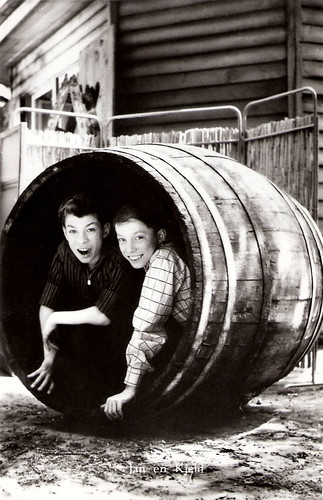
Dutch postcard by Hercules, Haarlem, no. 370. Photo: Hafbo. Publicity still for Marina (Paul Martin, 1960), distributed in The Netherlands by Hafbo Film.

German postcard by Rüdel-Verlag, Hamburg-Bergedorf, no. 3126. Photo: CCC / Gloria / Maack. Publicity still for Marina (Paul Martin, 1960).
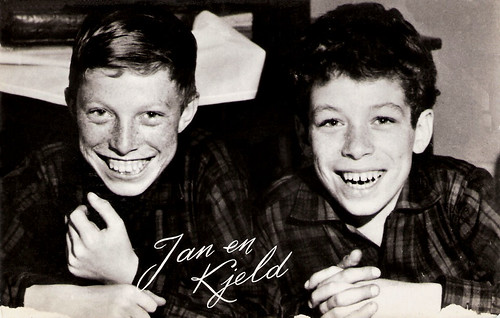
Dutch postcard by Uitg. Takken, Utrecht, no. AX 4372. Photo: CNR.
Left-handed
Kjeld Lennart Wennick was born in 1944 in Gränna, Sweden, and his brother Jan was born in 1936 in Copenhagen, Denmark.
At a young age, Kjeld learned to play the banjo and from 1954 on, he performed with his father Svend. Jan often accompanied them and also learned to play the banjo. As Jan was left-handed, a left-handed banjo was purchased for him.
In 1956 their father Svend stopped performing and Jan and Kjeld started performing alone as a duo. The boys won several song contests in Denmark, and soon they performed on radio and TV. Their first record was a cover of 'Down by the Riverside'. The duo became nationally known when they appeared on Danish television in 1957 on Denmark's first TV fundraising show, Entertainment for Millions, to raise money for refugees for the Hungarian uprising.
In 1958, they debuted in the Danish family film Far til fire og ulveungerne/Father of Four Wolf Pups (Alice O'Fredericks, Robert Saaskin, 1958). The film was part of a popular series about a single-parent family featuring Karl Stegger as the father.
When they performed, Jan always stood on the left side. He was left-handed so their banjos wouldn’t bump.
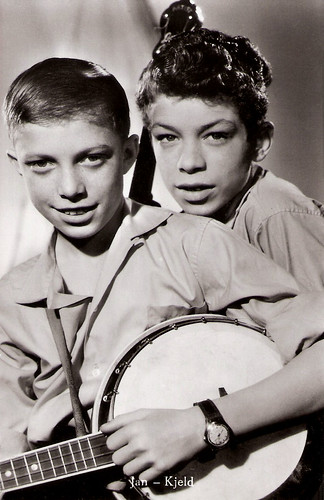
Dutch postcard by Hercules, Haarlem, no. 399.
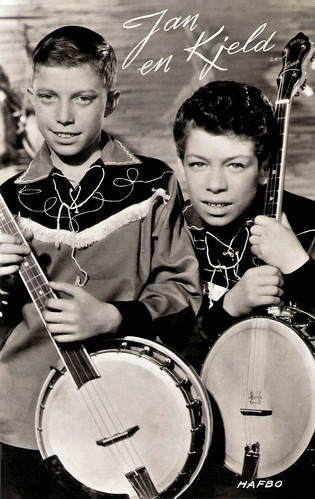
Dutch postcard by Uitg. Takken, Utrecht, no. AX 4542. Photo: Hafbo.
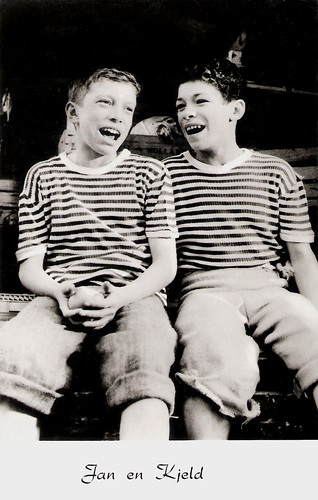
Dutch postcard, no. 5853.
Banjo Boy
In 1959, Jan & Kjeld signed with Germany’s Ariola label and the first records of ‘The Kids from Copenhagen’ were the covers 'Tom Dooley' and 'Tiger Rag' in 1959. In Denmark, ‘Tiger Rag’ was released on Triola Records as a B-side to a recording of the traditional ‘When the Saints Go Marching'.
In the Dixieland classic 'Tiger Rag', Kjeld did a sensational scat in Louis Armstrong style. The song became their first hit in both Denmark and Germany, where it spent several weeks on the charts.
Their breakthrough hit was 'Banjo Boy' (1959), which they sang in the film Kein Mann Zum Heiraten/No Man To Marry (Hans Deppe, 1959) with Marianne Hold.
In Denmark (#1), Germany (#1), Holland (#4) and a lot of other countries 'Banjo Boy' found the top 10. In Germany, they sold 4,5 million copies of the record. It earned the young duo a gold record and a Bronze Lion on Radio Luxembourg. Due to the song's success, Jan & Kjeld became known primarily as the ‘Banjo boys’ in Germany.
Words and music for the song were written by Austrian Schlager composer Charly Niessen, who also composed songs for Peggy March and Hildegard Knef. In 1960, American lyricist Buddy Kaye wrote English words for the song, and 'Banjo Boy' reached #58 in the USA and #36 in Great Britain.

German postcard by ISV, no. K 14.

Dutch postcard.
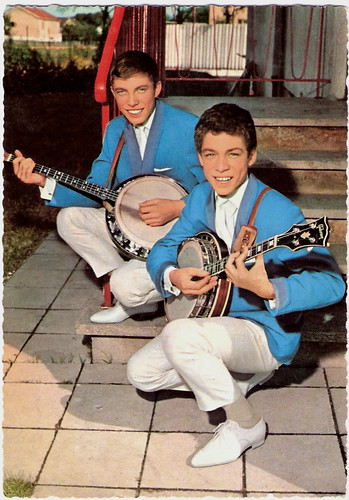
German postcard by Krüger, no. 902/182. Photo: Ariola.
Schlager films
In Germany, Jan & Kjeld became so popular that they played their songs in Schlagerfilms like Wir wollen niemals auseinandergehen/We Will Never Part (Harald Reinl, 1960), Gauner-Serenade/Rogue Serenade (Thomas Engel, 1960) and Marina (Paul Martin, 1960) with Giorgia Moll.
They played regularly with German conductor and big band leader Max Greger and his orchestra. Till 1963 'Die Banjo Boys' had twelve more hits in Germany with German language covers such as the Ricky Nelson cover 'Hello Mary Lou', which was #2 in Germany in 1961. In 1966 the singing career of the Danish teenagers was over but over the years they kept appearing in Golden Oldies shows.
Ten years later Jan & Kjeld tried a come-back with two disco songs in Danish: 'Så lyk'lige som vi' (So Lucky We Are) (1976) and 'Det går op, det går ned' (It Goes Up, It Goes Down) (1977). Then Jan retired from show business, but Kjeld remained active in it.
In 1983, Kjeld started his own music label, Mega Records, and in 1991, he enjoyed world success with the million-selling Swedish pop group Ace of Base. In 2001 he sold his label to Germany's Edel Music and the label's name thus became Edel-Mega Records.
In 2003 he was a jury member for one season of the Danish version of the TV talent show Idols and in 2005 he groomed celebrities to sing a song in the Danish game show Showtime. Since 2006 Kjeld Wennick has been the manager of a café near the harbour of Copenhagen. He died in 2020.
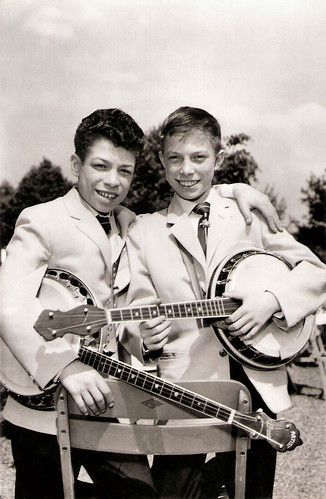
Dutch postcard by Gebr. Spanjersberg N.V., Rotterdam, no. 160 562.
Jan & Kjeld sing 'Banjo Boy' in Kein Mann Zum Heiraten/No Man To Marry (Hans Deppe, 1959). Source: fritz51203 (YouTube).
Jan & Kjeld perform the Louis Armstrong classic 'Tiger Rag' (1959). Source: Frans Jaspers (YouTube).
Sources: De Duitse Schlager (Dutch), Wikipedia (German, Dutch and Danish) and IMDb.
This post was last updated on 14 November 2024.
Have a much better audio recording on file than is attached to the
ReplyDelete"Hello Maryloo" segment.
I'd be happy to supply it for free
if requested.
Thank for this Postcard,
rolfgerig@bigpond.com